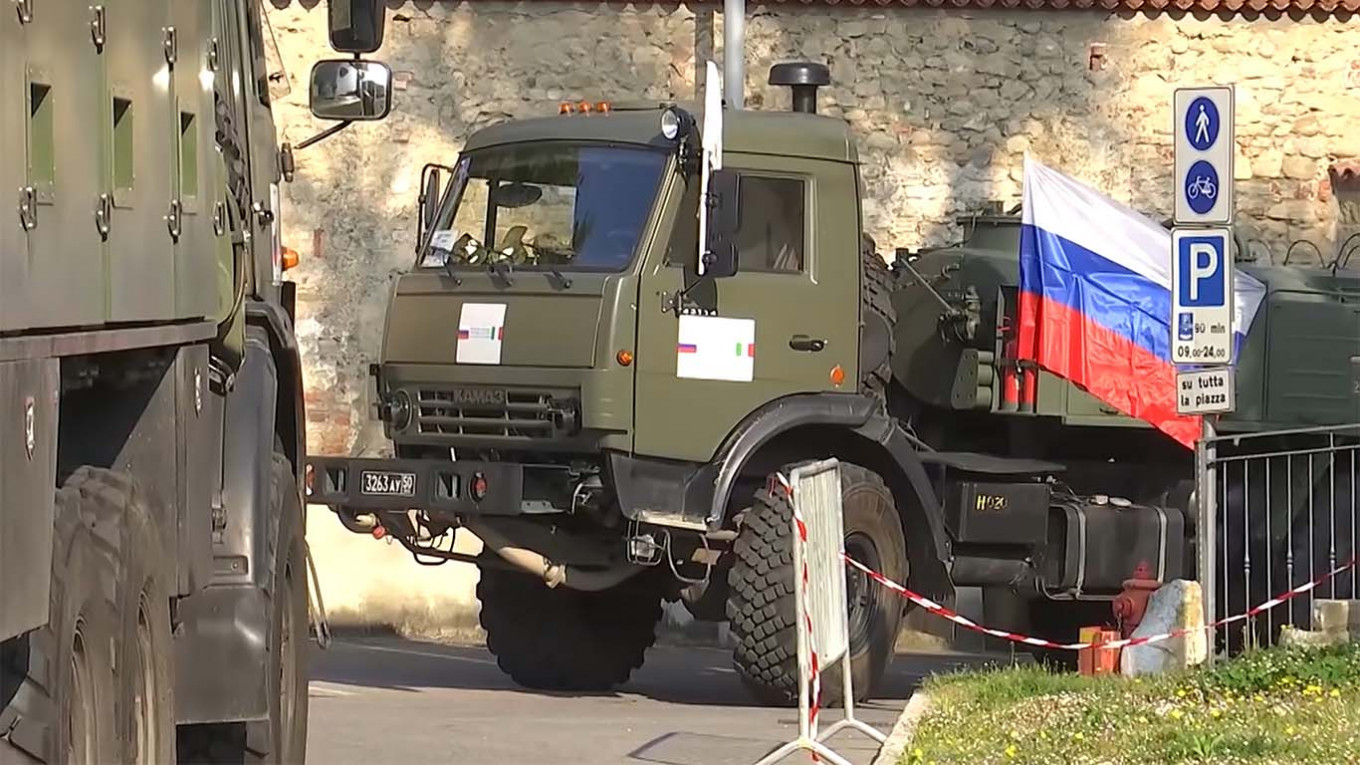‘From Russia With Love’ never gets old. The slogan was inscribed on military planes the Russian authorities sent to Italy in March as part of the Kremlin’s new “medical relief” operation to certain Western countries.
Moscow’s “pandemic exploitation” abroad started with the shipment of medical equipment to Italy on March 22. Rotations of military transport planes filled to the brim with supplies were filmed with great pomp as they left Russia.
Since then, the usefulness of Russian assistance has been put in doubt, as Italian whistleblowers said the supplies were not suitable for local requirements. For instance, shipments apparently lacked ventilators and other vital breathing assistance apparatus.
As well as medical equipment, Russia dispatched military medical brigades and personnel, including virologists, to Italy. This represented an opportunity for the authorities to obtain first-hand experience on how to contain the spread of the coronavirus.
April Fools beware: Moscow’s charm offensive continued on April 1 after presidents Trump and Putin agreed by phone to send similar Russian military aircraft to the United States. These cargos contained medical equipment and, more crucially, ventilators as well as masks for health and frontline workers.
Moscow’s helping hand is purely geopolitical. In the case of Italy, it underscores the absence of European solidarity in fighting the pandemic. For the United States, it makes Washington look weak and unable to cope with the crisis internally — especially as the medical supplies were not donated but purchased from a Russian company under U.S. sanctions and linked to the military industry.
These are symbols official Russian messaging will not fail to emphasise at home. Equally amplified is the narrative that, as the world struggles to fight coronavirus, a benevolent Kremlin is sacrificing much-needed medical supplies that could otherwise be used to save Russian citizens.
The situation is compounded by the fact that Moscow sent military, not civilian, transport aircraft to both countries. Under international sanction since 2014 for the illegal annexation of Crimea and aggression against Ukraine, the Kremlin wants to demonstrate it can also use its military for the “good.”
Russian medical assistance could have been interpreted as an act of selfless international solidarity if Moscow had also sent similar help to Spain. In reality, this represents a self-serving PR operation aimed at extorting immediate and future concessions from the West. Russian gifts always come with a price.
This begs the question: What is Moscow really after? The low-hanging fruit for the Kremlin is reciprocal assistance from the West when Russia experiences the worst phase of the viral outbreak in coming weeks.
Another hint is President Vladimir Putin’s appeal during the G20 Summit to freeze, if not lift, international sanctions on the supply of “essential goods” for the duration of the pandemic. In this regard, Putin’s call for humanitarian measures helps the Kremlin probe for weakness regarding the renewal of European economic sanctions.
Last December, EU sanctions were prolonged until the end of July 2020. Using Rome as a Trojan Horse in Brussels is therefore a double opportunity. The country is being crushed by the pandemic and Italian authorities are generally accommodating to the Kremlin.
It is harder to make out what Putin seeks to immediately achieve with Washington. Appealing to Trump in person has already proved a risky strategy, and there is only so much Moscow can hope to achieve when it comes to lifting U.S. economic sanctions. Washington’s current refusal to alleviate sanctions pressure on Iran during the pandemic is a stark reminder of this.
In a coronavirus world where international medical assistance has been politicized, Russian authorities are another part of the problem, and not of the solution. And there are plenty of targets the Kremlin is likely contemplating to further its “pandemic exploitation” agenda, notably in the Balkans and the Black Sea region.
It remains to be seen how effective the Kremlin’s charm offensive will be, what Moscow will genuinely obtain in return and whether the PR coup will eventually backfire.
A Message from The Moscow Times:
Dear readers,
We are facing unprecedented challenges. Russia's Prosecutor General's Office has designated The Moscow Times as an "undesirable" organization, criminalizing our work and putting our staff at risk of prosecution. This follows our earlier unjust labeling as a "foreign agent."
These actions are direct attempts to silence independent journalism in Russia. The authorities claim our work "discredits the decisions of the Russian leadership." We see things differently: we strive to provide accurate, unbiased reporting on Russia.
We, the journalists of The Moscow Times, refuse to be silenced. But to continue our work, we need your help.
Your support, no matter how small, makes a world of difference. If you can, please support us monthly starting from just $2. It's quick to set up, and every contribution makes a significant impact.
By supporting The Moscow Times, you're defending open, independent journalism in the face of repression. Thank you for standing with us.
Remind me later.








